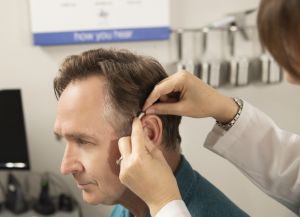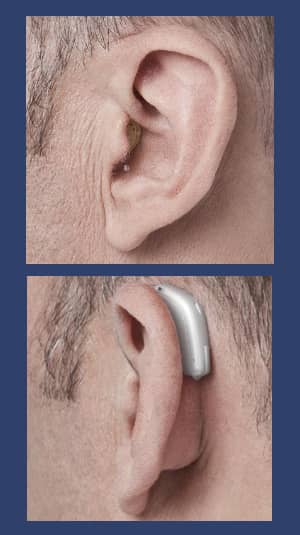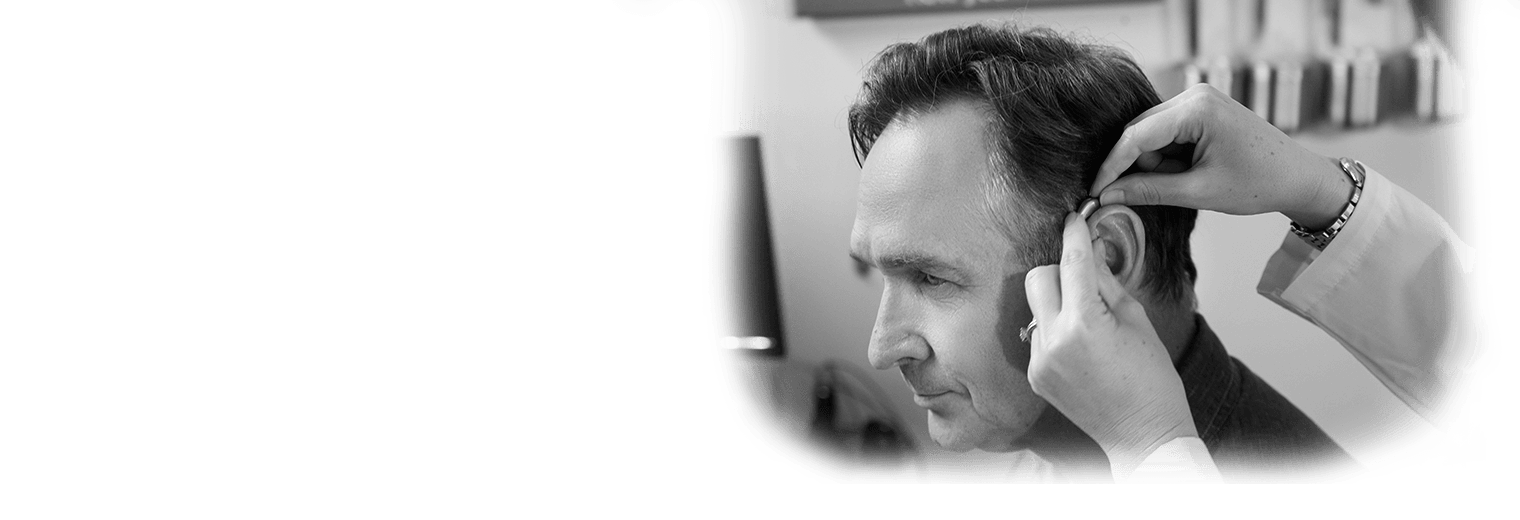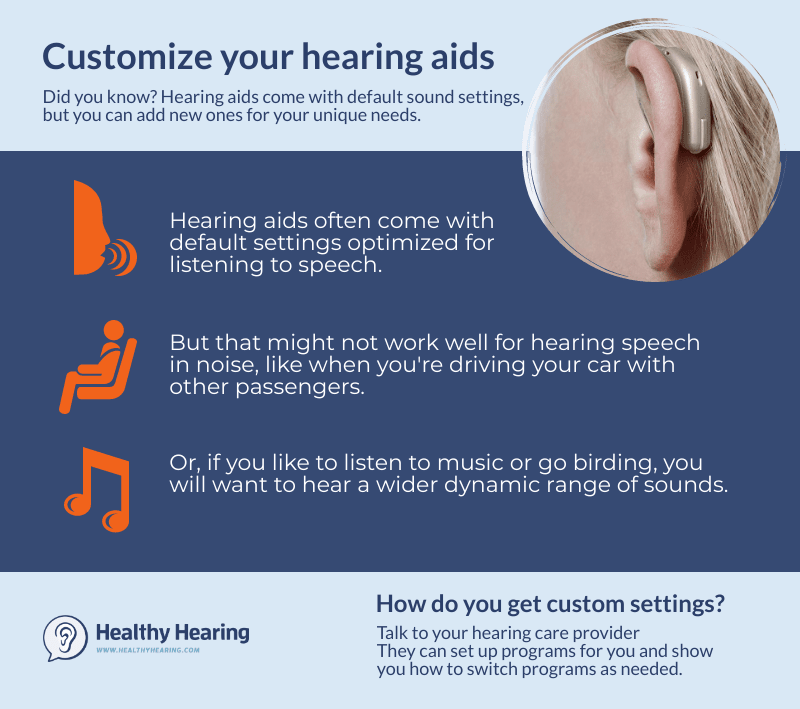|
www.HealthyHearing.com |
Hearing aid fitting
By Joy Victory, managing editor, Healthy Hearing  Reviewed by
Megan Gerhart, audiologist Reviewed by
Megan Gerhart, audiologist Last updated on: October 13th, 2023 Hearing aids work best when fitted and adjusted properly. Learn what goes into a successful hearing aid fitting and how to get the most from your experience. If hearing aids are recommended after your hearing is tested, your hearing care professional will work with you to find the right hearing aids for you. That selection process, called a hearing aid evaluation, starts with an assessment of your needs and making recommendations based on those needs. It ends with follow-up visits to allow for further customized programming of your hearing aids. Note: OTC hearing aids are self-fitting. The process below will not apply. Preferences and expectations
proper hearing aid selection is important. Your hearing care professional with an in-depth consultation with you to learn more about your lifestyle, your expectations, your personal preferences and your thoughts on any previous experiences with hearing aids. Your hearing test results, along with this information, will help the professional pull together some options for you to review. Hearing test resultsYour test will be charted on an audiogram to guide you and your hearing care professional. It shows at what volume you can hear tones. It also reveals your ability to understand words. Both tones and words are important to understanding your hearing needs. The degree of your hearing loss will determine which styles may work best for you, and what features of the devices will benefit you the most. It used to be that with more severe hearing losses you would need a larger device, but that is not the case anymore. Even small hearing aids can benefit those with significant degrees of hearing loss. If you've never worn hearing aids before, this primer on types and styles of hearing aids may be useful. What are your lifestyle needs?It's important for your provider to get a picture of the lifestyle you desire. You may have gradually avoided certain environments and social situations as your hearing loss worsened. Now is the time to think about what you’d like to be able to do with the help of your new hearing aids! For example, if you spend your evenings talking on to family and friends on the phone, you’ll want a hearing aid that works well with your phone. If you're a boater or on the water a lot, you may want waterproof hearing aids. If you work in a busy office, a hearing aid paired with assistive listening devices may be recommended to make group conversations easier. If you wear glasses, you may need help figuring out how to wear hearing aids and eyeglasses with minimal issues. Generally, more advanced digital hearing aids are designed for people who encounter many different listening situations with varying degrees of background noise. For sedentary people who are mostly at home with little background noise, basic models may be recommended. (Keep in mind that if mobility or traveling is a problem, seeing an audiologist using telehealth may be an option.) What are your preferences?
have, your provider may recommend in-the-ear or behind-the-ear aids. There are many different types of preferences that can affect hearing aid selection. Do you want hearing aids that are nearly invisible, or would you rather have something large enough that allows you to pick a bright color and show off your style? Do you prefer to have control over the volume of your aids or would you prefer to have automated technology that changes it for you? Do you want gadgets, like remote controls, or smartphone control via a hearing aid app and Bluetooth connectivity for your hearing aids? Your preferences may be affected by your level of manual dexterity, especially when it comes to selecting your preferred style of hearing aid batteries. Do you prefer rechargeable batteries that you dock each night? If not, will you be willing and able to change a small battery every few days to weeks? These are just a few of the preferences that the hearing care professional will explore with you. Have you worn hearing aids before?Finally, it’s important to consider any prior hearing aid experience when selecting a new hearing aid. Did you love your last set of hearing aids? Why? Did you like the style, the sound quality or something else? What did you have difficulty hearing with your old hearing aids? What new features would you like to try? This type of insight will help your hearing professional determine what you will need in your new hearing instruments to maintain—or improve—your level of success with hearing aids. Hearing aid selectionAfter you’ve discussed your needs with your hearing care professional, you will generally be presented with a few recommended options at different price points. In some cases, you might have the opportunity to wear demonstration hearing aids for a few hours or a few days to try out. Once you’ve made your decision, the hearing care professional will order your selection and schedule you to come back at a later date for the initial hearing aid programming, also called a hearing aid fitting. If you’ve decided on a custom-fit ITE style or a BTE with earmold style, your hearing care professional will take an impression of your ear canal to send in with the order. If you've selected a RIC or RITE style device, measurements will be made on the length of your ear to ensure a proper fit. An earpiece will be made, which can be adjusted at the fitting appointment. Initial hearing aid programmingWhen your hearing aid arrives at the hearing center, the hearing care professional will hook it up to the computer and calibrate it according to your hearing loss and preferences. Some professionals choose to do the programming before you arrive and some prefer to do it while you’re there. Many providers also will perform real ear measurement to verify the amplification levels are correct. If you have complex hearing loss, such as asymmetrical hearing loss, the fitting may take multiple appointments to get the sound quality just right, especially to help you create programs for specific sound settings for different environments. Adjusting to hearing aids takes timesIt's not as simple as new eyeglassesOnce the hearing aids are out of the box and in your ears, you’ll start hearing lots of things you haven’t heard for years. In fact, you might feel like everything is too loud at first. It will take time for your brain to relearn which sounds to ignore, like the sound of your own footsteps or the rustle of your clothing. But don’t worry—your hearing care professional will do some tests to make sure that the hearing aid is set appropriately for your hearing loss. You will also be counseled on how to change the battery, use any features, clean and take care of your hearing aid. Here's more on understanding the various parts of a hearing aid. Adjusting to hearing aids takes time. Some people only need a day or two but most people need a few weeks to a few months to adjust to using hearing aids. Many patients wait years with a hearing loss before getting a hearing aid. During this time, your brain has gotten used to not hearing well. Your brain will develop its "new normal" as you listen to the world around you with your new hearing aids. The important thing to remember is to wear them, even if just for a few hours the first day, an hour longer the following day, and so on until you are wearing hearing aids all day. The more you wear them in the beginning, the better off you will be in the long run. More:
Adding custom hearing aid settingsThe "default" setting for most hearing aids is focused on picking up speech in quiet environments. But out in the real world, sound is a lot more complex, particularly if you're a musician or work in a noisy environment. Fortunately, your hearing care provider can add custom hearing aid settings for you, including music settings.
Successful hearing aid fittings are as individual as you are. The right hearing care provider will take the time to understand your specific needs and tailor an approach that will get the best results. There is not one hearing aid that is right for everyone. The best hearing experience blends together great technology customized for you, in addition to a hearing care professional who will take all of your needs into consideration. Use our consumer-reviewed directory to find providers and hearing aids near you. Joy Victory, managing editor, Healthy Hearing
You are reading about: Related topics
More information about hearing loss, hearing aid brands, assistive devices and tinnitus. Featured clinics near me
Hearing Health Solutions from Ohio ENT - Columbus
Earzlink Hearing Care - Reynoldsburg Find a clinicWe have more hearing clinic reviews than any other site! Related contentThe Healthy Hearing Reportarticle
What is labyrinthitis? article
Degrees of hearing loss |
|
www.HealthyHearing.com |
Hearing aid fitting
By Joy Victory, managing editor, Healthy Hearing  Reviewed by
Megan Gerhart, audiologist Reviewed by
Megan Gerhart, audiologist Last updated on: October 13th, 2023 Hearing aids work best when fitted and adjusted properly. Learn what goes into a successful hearing aid fitting and how to get the most from your experience. |




 Joy Victory has extensive experience editing consumer health information. Her training in particular has focused on how to best communicate evidence-based medical guidelines and clinical trial results to the public. She strives to make health content accurate, accessible and engaging to the public.
Joy Victory has extensive experience editing consumer health information. Her training in particular has focused on how to best communicate evidence-based medical guidelines and clinical trial results to the public. She strives to make health content accurate, accessible and engaging to the public.